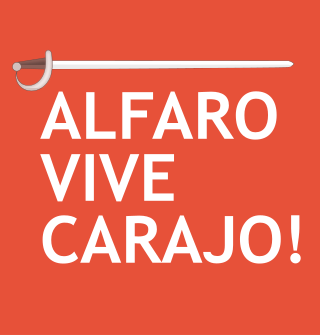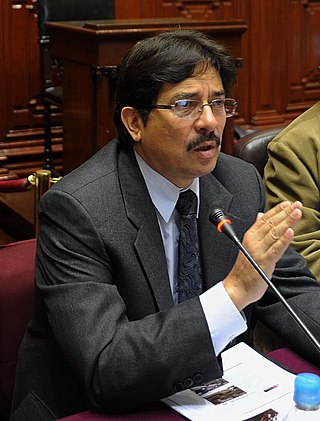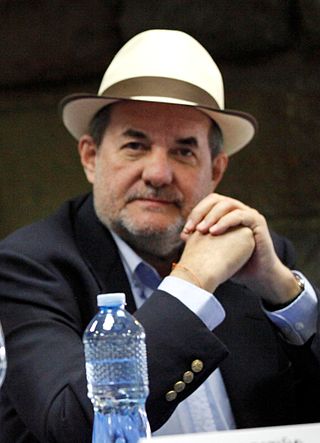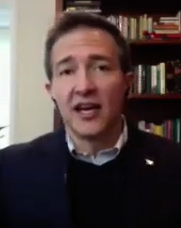
Ecuador, officially the Republic of Ecuador, is a country in northwestern South America, bordered by Colombia on the north, Peru on the east and south, and the Pacific Ocean on the west. Ecuador also includes the Galápagos Islands in the Pacific, about 1,000 kilometers (621 mi) west of the mainland. The country's capital is Quito, but its largest city is Guayaquil.
The History of Ecuador covers human habitation in the region reaching back 8,000 years.

The economy of Ecuador is the eighth largest in Latin America and the 69th largest in the world by total GDP. Ecuador's economy is based on the export of oil, bananas, shrimp, gold, other primary agricultural products and money transfers from Ecuadorian emigrants employed abroad. In 2017, remittances constituted 2.7% of Ecuador's GDP. The total trade amounted to 42% of the Ecuador's GDP in 2017.
The Fundación Colegio Americano de Quito or Colegio Americano de Quito is a private college preparatory school in Quito, Ecuador. In 1940 it was founded by the former president of Ecuador and the president of the Organization of American States (OAS) Galo Plaza Lasso, and Boaz Long.

¡Alfaro Vive, Carajo! (AVC), another name for the Fuerzas Armadas Populares Eloy Alfaro, was a clandestine left-wing group in Ecuador, founded in 1982 and named after popular government leader and general Eloy Alfaro. The group was labeled as a terrorist organization by the Ecuadorian state during the period of the former president León Febres Cordero. It existed between 1983 and 1991, when it carried out various armed actions and criminal acts in Ecuador, with Colombian (M-19) and Nicaraguan influence. The group was initially formed sometime in the 1970s, but was not active militarily for the first few years of the 80's.

Rafael Vicente Correa Delgado is an Ecuadorian politician and economist who served as President of Ecuador from 2007 to 2017. The leader of the PAIS Alliance political movement from its foundation until 2017, Correa is a democratic socialist and his administration focused on the implementation of left-wing policies. Internationally, he served as president pro tempore of the UNASUR.

The Central Bank of Ecuador is the central bank of the country, and an institution of the Executive Function, which has institutional, administrative, financial, and technical autonomy. It is in charge of executing the monetary policy established by the Monetary Policy and Regulation Board of Ecuador, which has been the institution's highest governing body since October 2021.

The Revolutionary and Democratic Ethical Green Movement (MOVER, Spanish: Movimiento Verde Ético Revolucionario y Democrático) is a centre-right neoliberal and environmentalist political party in Ecuador. In 2016, it had 979,691 members. Until 2021 it was known as the PAIS Alliance (Proud and Sovereign Homeland) (PAIS, Spanish: Alianza PAIS (Patria Altiva i Soberana)).
The economic history of Ecuador covers the development of Ecuador's economy throughout its history, beginning with colonization by the Spanish Empire, through independence and up to the 21st century.
Ecuador is a country in South America.

Enrique Javier Cornejo Ramirez is a Peruvian politician who was the former Minister of Transportation and Communications that was under President Alan García from September 2010 to July 2011. Prior to that, he was the Minister of Housing and Construction.

Guillermo Alberto Santiago Lasso Mendoza is an Ecuadorian businessman, banker and politician who served as the 47th president of Ecuador from 2021 to 2023. He was the country's first conservative president in nearly two decades, marking a shift in the country's electorate.

José Serrano Salgado is an Ecuadorian politician. He was President of the National Assembly between 14 May 2017 and 9 March 2018. He was Minister of the Interior from 13 May 2011 to 15 November 2016. He previously held other cabinet posts.

Freddy Ehlers Zurita is an Ecuadorian politician. As of June 2013, he is Ecuador's State Secretary for the Presidential Initiative for the Construction of a Society of Good Life. Previously, he was Minister of Tourism from 10 May 2010 until June 2013. In 1996 and 1998, Ehlers stood candidate for the office of President of Ecuador. Between 1 February 2007 and 7 May 2010, Ehlers was the Secretary-General of the Andean Community of Nations

Gabriela Alejandra Rivadeneira Burbano is an Ecuadorian politician. She was President of the National Assembly of Ecuador between May 2013 and May 2017. Previously she was Governor of Imbabura Province from 2011 to 2012.
Galo Galecio Taranto was a prominent Ecuadorian painter, muralist, sculptor, caricaturist, and printmaker, whose work is known for its political content and recurring theme of Afro-Latin American life and culture.

The Citizen Revolution Movement is a democratic socialist political party in Ecuador formed by supporters of former President Rafael Correa who distanced themselves from Correa's former PAIS Alliance party during the presidency of Lenín Moreno. The party takes its name from the term used to refer to the project of building a new society.
The COVID-19 pandemic in Ecuador was a part of the worldwide pandemic of coronavirus disease 2019 caused by severe acute respiratory syndrome coronavirus 2. The virus was reported to have spread to Ecuador on 29 February 2020, when a woman in her 70s tested positive for the virus. Ecuador was described in April as emerging as a possible "epicentre" of the pandemic in Latin America, with the city of Guayaquil overwhelmed to the point where bodies were being left in the street.

Sonia Roca is the Chancellor and Founder of Universidad Del Pacífico - Ecuador.

Pedro José Freile Vallejo is an Ecuadorian lawyer and politician who ran for President of Ecuador in the 2021 election. Freile was born in Quito, Ecuador. He served as Director of the Inter-American Development Bank part of the Ecuador Division from 2004 to 2005.














